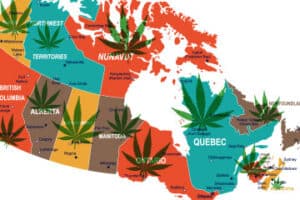On October 17, 2023, it will have been five years since cannabis was legalized for non-medical use, production and sale in Canada, making Canada the first major industrialized country to provide legal and regulated access to cannabis for non-medical purposes.

Details of The Cannabis Act
- The Cannabis Act (C-45) came into force on October 17, 2018. The Act legalizes and strictly regulates the production, distribution, sale, import and export, and possession of cannabis for adults of legal age.
- During the first year of legalization of cannabis for non-medical purposes, legal sales were limited to dried cannabis, fresh cannabis, cannabis oil, cannabis plants and cannabis seeds. Starting on October 17, 2019, a wider array of products was permitted for legal production and sale, including cannabis extracts, edibles and topicals.
- The regulation of cannabis remains a shared responsibility of the federal, provincial and territorial governments. Provinces and territories are responsible for regulating cannabis sales and distribution in their jurisdiction. They also have the flexibility to establish more stringent controls, such as further restrictions for personal (home) cultivation, restricting public use and access to some products, or increasing the minimum legal age.
The main objectives of the Act are to keep cannabis out of the hands of youth, keep profits out of the pockets of criminals, and protect public health and safety by allowing adults access to a quality-controlled supply of legal cannabis.
To measure the social, health and economic impacts of legalized cannabis, Statistics Canada identified data needs and adapted the national statistical system. This included introducing new surveys, exploring alternative data sources, adding new questions to existing surveys and integrating cannabis into the Canadian System of Macroeconomic Accounts.
Cannabis use had been steadily increasing over the 30 years before legalization
The rate of cannabis use more than doubled from 1985 to 2017, from 5.6% to 14.8%.
After legalization, cannabis use is higher
In 2021, 22% of Canadians aged 15 years and older reported using cannabis in the past year. The rates of cannabis use were higher than the rest of Canada in British Columbia, Alberta, Ontario, Nova Scotia and Prince Edward Island, whereas those in Quebec remained lower.
Some studies conducted during the COVID-19 pandemic suggested that cannabis consumption may have increased in response to the changed daily routines and related stress. Whether the higher rates of cannabis use reported during the pandemic will continue is yet to be determined, but as daily routines are reinstated and newer data become available, this can be studied.
Cannabis use also differs by age and increases for most age groups
Cannabis use is most common among 18- to 24-year-olds. Use among 15- to 17-year-olds has not increased since legalization.
Canada’s cannabis sector grew from October 2018 to December 2022 but started to decline in 2023
The cannabis sector was valued at $10.8 billion in 2023, an increase from $6.4 billion when cannabis for non-medical purposes was first legalized.

Cannabis-related drug offences drop as a result of legalization
Before legalization, cannabis possession was almost always illegal and accounted for the majority of cannabis-related drug offences. After legalization, total cannabis-related offences fell overall, and under the new legislation, most offences are related to illicit importation and exportation. For example, in 2022, two-thirds (67%) of the 10,824 total cannabis offences were for illicit importation and exportation, and 12% of cannabis-related offences were for possession.
More Canadians get cannabis legally
An estimated 68% of cannabis users reported obtaining at least some of the cannabis they consumed from a legal source in 2020, higher than the percentages reported before legalization in 2018 (23%) and just after legalization in 2019 (47%). This accords with other data suggesting that, by the first half of 2023, more than 70% of the total value of cannabis consumed in Canada was from a legal (licensed medical and non-medical) source, an increase from 22% in the fourth quarter of 2018, when legalization was implemented.
Cannabis use can be harmful
- According to a 2023 Health Reports study, 4.7% of past-year cannabis consumers (300,000 people) experienced impaired control over their use of cannabis.
- Impaired control is a key element of dependency (addiction).
- Monitoring the number of Canadians at risk of developing a cannabis addiction is important, as addiction can harm health and negatively affect school performance, work and financial well-being.
- An improved understanding of the patterns of use and the characteristics of the people vulnerable to dependency could help with the development of more effective policy, prevention and education initiatives.
Factors independently associated with a cannabis user’s risk of developing impaired control (element of dependency), included
- frequently using cannabis
- being male
- being 18 to 24 years old (compared with being older)
- being single or never married (compared with being married or in a common-law relationship)
- being from a lower-income household (compared with being from a higher-income one)
- having been diagnosed with an anxiety or mood disorder
- having started using cannabis by age 15 or younger (compared with starting at age 16 or 17).


